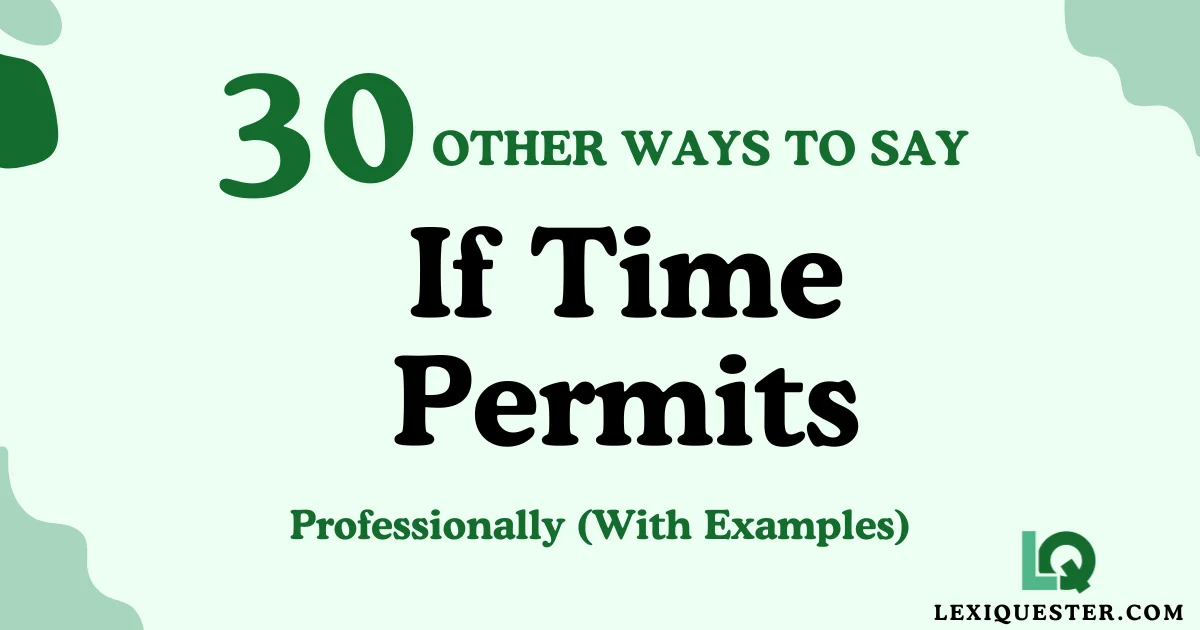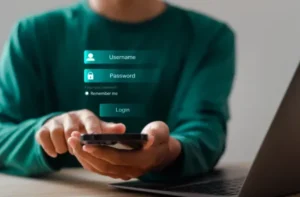When it comes to professional communication, striking the right tone is crucial. Whether you’re scheduling meetings, setting expectations, or asking for a little extra time, finding the right words can make all the difference in how your message is received.
Phrases like “if time permits” can be a polite way to express flexibility, but it’s important to vary your language to suit different contexts. Below, we explore 30 alternatives to express this idea with care and professionalism, helping your communication feel more thoughtful and genuine.
What Does “If Time Permits” Mean?
“If time permits” is a polite and respectful way of indicating that something is dependent on available time. It’s often used when making requests, setting deadlines, or offering flexibility. The phrase implies that if there is enough time, a task or activity will be completed or pursued. It reflects a sense of courtesy and consideration for others’ schedules.
When to Use “If Time Permits”
This phrase is commonly used in both formal and informal settings to express a degree of uncertainty regarding the availability of time. You might use it when suggesting additional work or actions, scheduling extra meetings, or offering flexibility without guaranteeing that something can be done. It’s useful when showing politeness, especially when you’re aware of someone’s busy schedule.
Is It Professional/Polite to Say “If Time Permits”?
Yes, “if time permits” is both professional and polite. It shows that you are considering the time constraints of others, which is always appreciated in a work environment. However, it’s important to ensure that the phrase is used in appropriate contexts. If overused or used carelessly, it may appear like you’re not fully committed to an action.
If Time Permits Synonyms:
- If It’s Convenient
- When You Have a Moment
- Should Time Allow
- If You Have the Availability
- When It’s Possible
- As Time Allows
- When You’re Available
- If It Fits into Your Schedule
- If It Doesn’t Disrupt Your Schedule
- If Time Is On Our Side
- Whenever You Have Time
- When You Get a Chance
- If There’s Time
- Whenever It’s Convenient
- At Your Convenience
- If You’re Free
- When You’re Unoccupied
- Should Time Allow
- If We Have Enough Time
- If It Works with Your Schedule
- When You Have Some Free Time
- If It’s Not Too Much Trouble
- When It’s Most Convenient for You
- If You Get a Break
- When You Have Room in Your Schedule
- If You Can Squeeze It In
- Whenever It’s Possible for You
- If It Works for You
- When You Find a Moment
- If You Have a Spare Moment
1. If It’s Convenient
- Meaning: A polite way of asking for flexibility, focusing on the other person’s convenience.
- Definition: This phrase implies that the action or request can be accommodated at a time that suits the other person’s schedule.
- Scenario Example: “Please let me know if it’s convenient to discuss this further later today.”
- Tone: Considerate and polite.
2. When You Have a Moment
- Meaning: An informal yet respectful way to ask for someone’s time.
- Definition: This phrase implies that the request will only take a small amount of time and can be done when the person is free.
- Scenario Example: “Let’s chat about this when you have a moment.”
- Tone: Friendly, respectful, and casual.
3. Should Time Allow
- Meaning: A more formal version of “if time permits,” suitable for professional settings.
- Definition: This phrase suggests that actions or activities will be dependent on the time available.
- Scenario Example: “Should time allow, I would like to present additional details in the meeting.”
- Tone: Formal, courteous.
4. If You Have the Availability
- Meaning: Indicates that the action will take place if the other person has time.
- Definition: A considerate way to express flexibility based on someone else’s schedule.
- Scenario Example: “If you have the availability, I would appreciate your feedback on the draft.”
- Tone: Polite, formal.
5. When It’s Possible
- Meaning: Implies that something can be done when it’s feasible, offering flexibility.
- Definition: This phrase acknowledges that the task depends on what’s possible within the time constraints.
- Scenario Example: “Let’s discuss this when it’s possible for you.”
- Tone: Respectful and understanding.
6. As Time Allows
- Meaning: A slight variation of “if time permits,” often used in professional contexts.
- Definition: This phrase is used to indicate that a task or meeting is contingent on the available time.
- Scenario Example: “We can address this as time allows during the meeting.”
- Tone: Professional, considerate.
7. When You’re Available
- Meaning: A simple and direct way to suggest flexibility based on the other person’s schedule.
- Definition: This phrase indicates that the request can be completed when the person has free time.
- Scenario Example: “We can continue this conversation when you’re available.”
- Tone: Direct, polite.
8. If It Fits into Your Schedule
- Meaning: A courteous way of asking someone to consider your request if they can make time for it.
- Definition: This phrase conveys an understanding of the other person’s busy schedule while making the request.
- Scenario Example: “Please let me know if it fits into your schedule to review this document.”
- Tone: Polite, respectful.
9. If It Doesn’t Disrupt Your Schedule
- Meaning: A considerate way to express flexibility while being mindful of the person’s commitments.
- Definition: This phrase shows that you are aware of the other person’s time commitments and prefer to work around them.
- Scenario Example: “I’d love to meet if it doesn’t disrupt your schedule.”
- Tone: Considerate, thoughtful.
10. If Time Is On Our Side
- Meaning: A more casual expression indicating that a task can be completed if there’s enough time.
- Definition: This phrase suggests that if time permits, the task can be carried out or completed.
- Scenario Example: “If time is on our side, we can cover all the points in today’s meeting.”
- Tone: Casual, optimistic.
11. Whenever You Have Time
- Meaning: A polite request for someone’s time, indicating flexibility.
- Definition: This phrase offers the person the freedom to choose when they can dedicate time to your request.
- Scenario Example: “Whenever you have time, please send over your comments.”
- Tone: Respectful, patient.
12. When You Get a Chance
- Meaning: An informal phrase suggesting flexibility, often used in less formal environments.
- Definition: This phrase invites the person to take action when it’s convenient for them.
- Scenario Example: “Please let me know when you get a chance to review the report.”
- Tone: Casual, friendly.
13. If There’s Time
- Meaning: A concise way to express the possibility of completing something, depending on time constraints.
- Definition: This phrase acknowledges that a task or meeting is subject to the availability of time.
- Scenario Example: “We can discuss this further if there’s time at the end of the meeting.”
- Tone: Concise, flexible.
14. Whenever It’s Convenient
- Meaning: A polite way to suggest that something can be done when it’s most convenient for the other person.
- Definition: This phrase conveys your respect for the other person’s time while still expressing a desire to proceed with the task.
- Scenario Example: “Feel free to call me whenever it’s convenient for you to discuss the project.”
- Tone: Polite, respectful.
15. At Your Convenience
- Meaning: A formal way to express flexibility based on the other person’s available time.
- Definition: This phrase suggests that the task or request can be completed whenever it suits the other person.
- Scenario Example: “We can arrange a meeting at your convenience.”
- Tone: Formal, respectful.
16. If You’re Free
- Meaning: A casual and informal way to ask for someone’s time, focusing on their availability.
- Definition: This phrase invites the person to engage when they have time to spare.
- Scenario Example: “Let’s talk about this more if you’re free this afternoon.”
- Tone: Friendly, informal.
17. When You’re Unoccupied
- Meaning: A more formal way of expressing the desire to talk or meet when the person has no other pressing tasks.
- Definition: This phrase suggests a clear window of availability for the person to engage.
- Scenario Example: “We can discuss this further when you’re unoccupied with other matters.”
- Tone: Formal, polite.
18. Should Time Allow
- Meaning: A respectful and formal way to offer flexibility if time permits.
- Definition: This phrase indicates that the requested action or conversation is dependent on the availability of time.
- Scenario Example: “Should time allow, we could extend the meeting to include additional points.”
- Tone: Formal, polite.
19. If We Have Enough Time
- Meaning: A more direct way to express that something will happen only if there’s time for it.
- Definition: This phrase is used when you want to discuss or complete something but are uncertain about the time available.
- Scenario Example: “If we have enough time, we’ll review the last item on the agenda.”
- Tone: Direct, practical.
20. If It Works with Your Schedule
- Meaning: A polite way to ask for someone’s time based on their schedule.
- Definition: This phrase acknowledges that the person’s time may be limited and suggests flexibility.
- Scenario Example: “Let me know if it works with your schedule to meet tomorrow.”
- Tone: Considerate, polite.
21. When You Have Some Free Time
- Meaning: A polite and casual way to suggest someone complete a task when they have spare time.
- Definition: This phrase gently asks for someone’s time, acknowledging that they may have other commitments.
- Scenario Example: “Let me know when you have some free time to discuss the next steps.”
- Tone: Friendly, considerate.
22. If It’s Not Too Much Trouble
- Meaning: A courteous way of asking for something without imposing on the other person.
- Definition: This phrase is used when making a request that the speaker knows may require effort, offering flexibility.
- Scenario Example: “If it’s not too much trouble, could you help me with this task later?”
- Tone: Polite, humble.
23. When It’s Most Convenient for You
- Meaning: A considerate way of indicating that the action will occur at the best time for the other person.
- Definition: This phrase offers the recipient the flexibility to choose the most suitable time.
- Scenario Example: “Feel free to send me the details when it’s most convenient for you.”
- Tone: Considerate, respectful.
24. If You Get a Break
- Meaning: A casual expression requesting attention when the person is not busy.
- Definition: This phrase implies that the task or request will be completed when the person has a break in their schedule.
- Scenario Example: “Let me know if you get a break during the day to chat about the project.”
- Tone: Casual, informal.
25. When You Have Room in Your Schedule
- Meaning: Suggests that the task or discussion will happen when the person has enough time.
- Definition: This phrase acknowledges that the person may have a busy schedule and implies that flexibility is key.
- Scenario Example: “Please review the proposal when you have room in your schedule.”
- Tone: Respectful, flexible.
26. If You Can Squeeze It In
- Meaning: A casual way of requesting someone to find time for a task, acknowledging that they may be busy.
- Definition: This phrase gently asks for someone’s time, understanding that they might be pressed for time.
- Scenario Example: “If you can squeeze it in today, please send over the report.”
- Tone: Casual, friendly.
27. Whenever It’s Possible for You
- Meaning: A polite way of suggesting a time that works for the other person without pressure.
- Definition: This phrase shows respect for the person’s time and allows them to decide when they can fulfill the request.
- Scenario Example: “I’d appreciate it if you could get back to me whenever it’s possible for you.”
- Tone: Considerate, polite.
28. If It Works for You
- Meaning: A flexible and respectful way of asking for time, based on the other person’s availability.
- Definition: This phrase shows that you are willing to work around the other person’s schedule.
- Scenario Example: “Please let me know if it works for you to meet next week.”
- Tone: Respectful, accommodating.
29. When You Find a Moment
- Meaning: A gentle request for someone’s time, acknowledging that their schedule may be packed.
- Definition: This phrase suggests that the task or discussion can happen when the person finds a moment of availability.
- Scenario Example: “Let me know when you find a moment to catch up on the details.”
- Tone: Polite, gentle.
30. If You Have a Spare Moment
- Meaning: An informal and considerate way to ask for someone’s time, assuming they have a moment to spare.
- Definition: This phrase shows that you understand the person may be busy and you’re requesting only a small amount of time.
- Scenario Example: “Could you look at this when you have a spare moment?”
- Tone: Casual, polite.
Conclusion
Mastering the art of asking for time and flexibility in professional communication can go a long way in ensuring your messages are received with warmth and respect.
Using any of these 30 alternatives to “if time permits” will not only make your communication more personal and meaningful but will also demonstrate your consideration for others’ time.
By selecting the right words for the right situation, you can ensure that your message remains both polite and effective.
Recent Posts
30 Other Ways to Say “Hope to See You Soon” Professionally (With Examples)
30 Other Ways to Say “Bring to Your Attention” Professionally (With Examples)
30 Other Ways to Say “Please Let Me Know if I Can Be of Any Help” Professionally (With Examples)
30 Other Ways to Say “Hope This Helps” Professionally (With Examples)

Daniel Jack is a passionate writer and founder of LexiQuester, a platform dedicated to unraveling the mysteries of words and language. With a love for storytelling and linguistic exploration, he crafts engaging content that inspires curiosity. When he’s not writing, Daniel enjoys diving into books and discovering hidden gems of knowledge.














